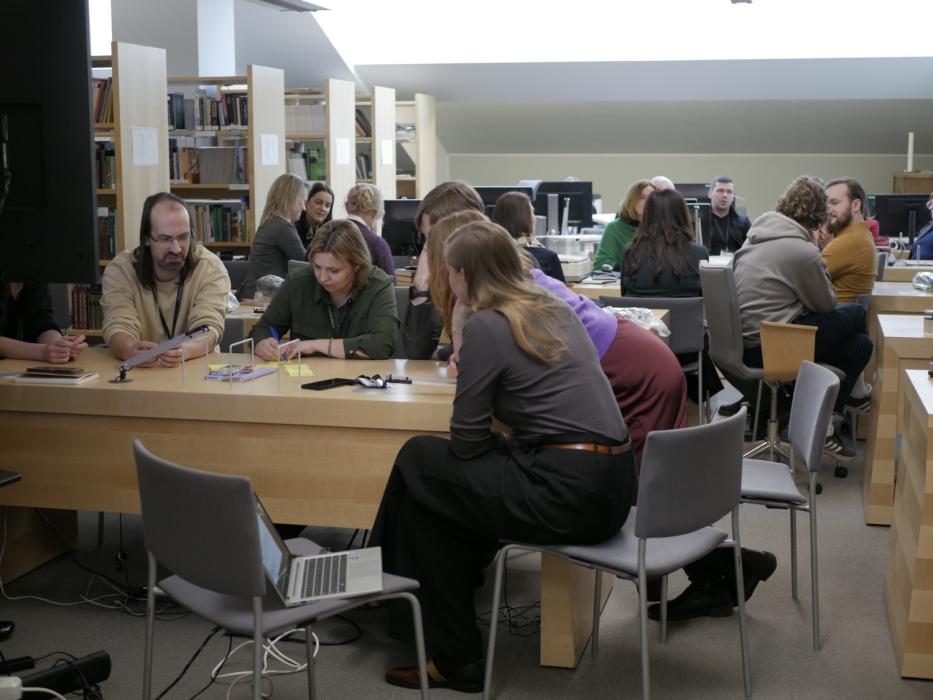Discussing the interaction between climate change and living heritage

During climate change, in addition to strengthening long-term cooperation between intangible cultural heritage communities, scientists, and policymakers, it is essential to improve public awareness of the risks posed and the possibilities for adaptation. This was the consensus among representatives from various fields during the discussions on climate and culture titled “Green Heritage”, held on March 6 and 7 in Riga, organized in Latvia by the Institute of Literature, Folklore and Art of the University of Latvia.
Participants in the roundtable discussions emphasized that in order to take purposeful action in protecting intangible cultural heritage during climate change, awareness is key—as is a deeper understanding of connections, the inclusion of environmental topics in education at all levels (including non-formal education), active involvement of local communities in strategic planning and public consultations, and the promotion of good practices.
The discussants not only identified the current impacts of climate change on various living heritage practices within Latvia’s cultural landscape, but also saw traditional knowledge and skills as a source of inspiration for a more climate-friendly lifestyle and for adapting to new conditions.
At the European level, it would be important to consider targeted funding opportunities for intangible cultural heritage initiatives as an adaptation strategy in the face of climate change. Developing multi-level adaptation strategies for both existing risks and potential future threats is essential – using already existing climate change analysis tools for planning future action models.
The opinions of the participants – experts, scientists, and representatives of intangible cultural heritage communities – will soon be integrated into the policy recommendations being developed within the “Green Heritage. The Impact of Climate Change on Intangible Cultural Heritage” project, for both national and European levels. These recommendations will also be included in the “Green Heritage” Handbook, which will be compiled in 2025 by an international team as the project concludes.
The second day of the discussions was dedicated not only to summarizing the roundtable conclusions and communicating them to the broader public but also to outlining the current situation on the European scale. Extreme weather events and their various impacts on intangible cultural heritage were highlighted as one of the most common risks. Research has revealed that climate change is already directly affecting several traditions in European countries, including:
-
lamprey fishing and processing skills in Carnikava (Latvia),
-
viticulture traditions in Germany,
-
mountaineering in Switzerland, Italy, and France,
-
the preparation of Valencian paella in Spain,
-
natural ice skating in the Netherlands,
-
the Cherry Festival in Italy,
and others.
These identified examples have been detailed in the interactive online tool – the “Green Heritage” Case Study Map.
The discussions concluded with a screening of the documentary film “Smart Farming – The Zimbabwe Story”, created in 2024 by director Kārlis Lesiņš, cinematographer Mārtiņš Jurevics, and producer Ingrīda Strazdiņa. The film highlighted the interconnectedness of cultural heritage, climate change, and climate justice. Addressing the viewers, director Kārlis Lesiņš emphasized the importance of avoiding stereotypical perceptions when documenting these themes, and instead encouraged an honest and comprehensive view of the topics presented in the film.
The roundtable discussion event was part of the international ERASMUS+ project “Green Heritage. The Impact of Climate Change on the Intangible Cultural Heritage” (D5.13 Policy Roundtable – M29), which brings together partners and researchers from Latvia, Greece, Italy, Spain, and Belgium to raise awareness of the direct and indirect impacts of climate change on intangible cultural heritage and its sustainability. Latvia is represented in the project by the Institute of Literature, Folklore and Art of the University of Latvia.